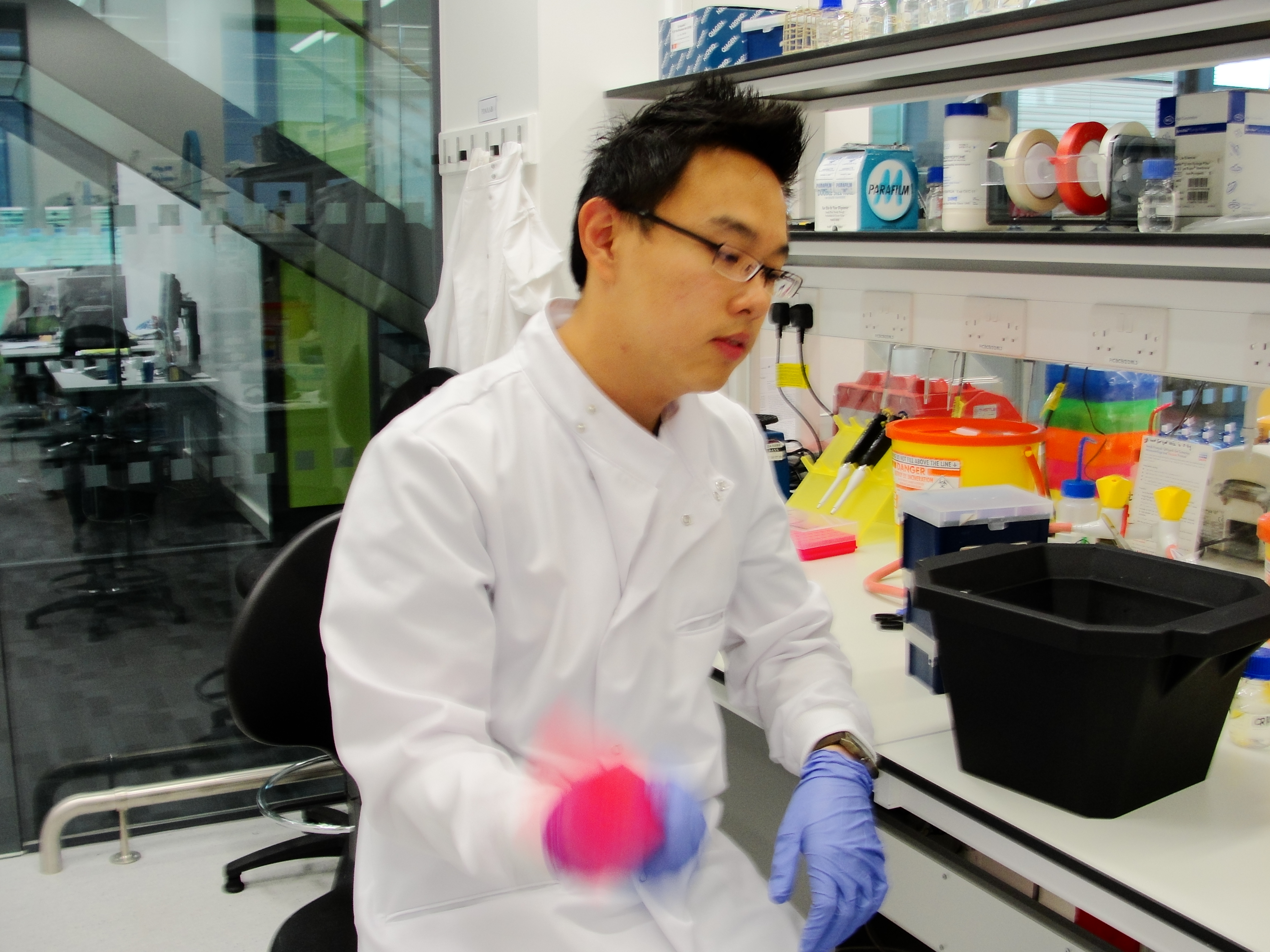Team:Newcastle/27 July 2010
From 2010.igem.org
Swoodhouse (Talk | contribs) |
(→Preparation for cloning of the rocF BioBrick) |
||
| (25 intermediate revisions not shown) | |||
| Line 1: | Line 1: | ||
{{Team:Newcastle/mainbanner}} | {{Team:Newcastle/mainbanner}} | ||
| - | + | ||
| + | =Genomic DNA extraction experiment= | ||
[[Image:Newcastle alan chromosome.jpg|thumb|200px|right]] | [[Image:Newcastle alan chromosome.jpg|thumb|200px|right]] | ||
[[Image:Newcastle ice chromosome.jpg|thumb|200px|right]] | [[Image:Newcastle ice chromosome.jpg|thumb|200px|right]] | ||
| - | + | ==Aims== | |
| - | The aim of today's experiment is to extract genomic DNA from both ''B. subtilis'' strains 168 and 3610. The genes necessary for the swarming | + | The aim of today's experiment is to extract genomic DNA from both ''B. subtilis'' strains 168 and 3610. The genes necessary for the [[Team:Newcastle/Swarming|swarming BioBrick]] and [[Team:Newcastle/Urease|''rocF'' BioBrick]] will then hopefully be obtained from the genomic DNA using PCR. |
| - | + | ||
| - | + | ||
| - | + | ||
| - | + | ||
| - | + | ||
| - | + | ||
| - | + | ||
| - | + | ||
| - | + | ||
| - | + | ||
| - | + | ||
| - | + | ||
| - | + | ||
| - | + | ||
| - | + | ||
| - | + | ||
| - | + | ||
| - | * | + | ==Protocol== |
| + | * Please refer to: [[Team:Newcastle/DNA extraction| DNA extraction of ''B. subtilis'']] for materials required and protocol. | ||
| - | == | + | ==Discussion== |
| + | At the end of the DNA precipitation step, we observed a small white pellet in all the eppendorf tubes. | ||
| - | + | ==Conclusion== | |
| + | The experiment was a success! The quality of the extracted DNA will be checked by using PCR on 28th July, 2010. | ||
| + | =Preparation for cloning of the rocF BioBrick= | ||
| + | ==Results== | ||
| + | Yesterday, we transformed ''E. coli'' DH5α with pSB1C3 and [http://partsregistry.org/Part:pSB1AK3 pSB1AK3] with [http://partsregistry.org/Part:BBa_B0014 BBa_B0014]. After checking the plates today for colonies we observed lots of pink colonies on the pSB1C3 plates and numerous white colonies on the [http://partsregistry.org/Part:pSB1AK3 pSB1AK3] with [http://partsregistry.org/Part:BBa_B0014 BBa_B0014] plates. Plates were then stored at 4°C as colonies will be used for minipreps. | ||
{{Team:Newcastle/footer}} | {{Team:Newcastle/footer}} | ||
Latest revision as of 22:12, 27 October 2010

| |||||||||||||
| |||||||||||||
Contents |
Genomic DNA extraction experiment
Aims
The aim of today's experiment is to extract genomic DNA from both B. subtilis strains 168 and 3610. The genes necessary for the swarming BioBrick and rocF BioBrick will then hopefully be obtained from the genomic DNA using PCR.
Protocol
- Please refer to: DNA extraction of B. subtilis for materials required and protocol.
Discussion
At the end of the DNA precipitation step, we observed a small white pellet in all the eppendorf tubes.
Conclusion
The experiment was a success! The quality of the extracted DNA will be checked by using PCR on 28th July, 2010.
Preparation for cloning of the rocF BioBrick
Results
Yesterday, we transformed E. coli DH5α with pSB1C3 and [http://partsregistry.org/Part:pSB1AK3 pSB1AK3] with [http://partsregistry.org/Part:BBa_B0014 BBa_B0014]. After checking the plates today for colonies we observed lots of pink colonies on the pSB1C3 plates and numerous white colonies on the [http://partsregistry.org/Part:pSB1AK3 pSB1AK3] with [http://partsregistry.org/Part:BBa_B0014 BBa_B0014] plates. Plates were then stored at 4°C as colonies will be used for minipreps.
 
|
 "
"

